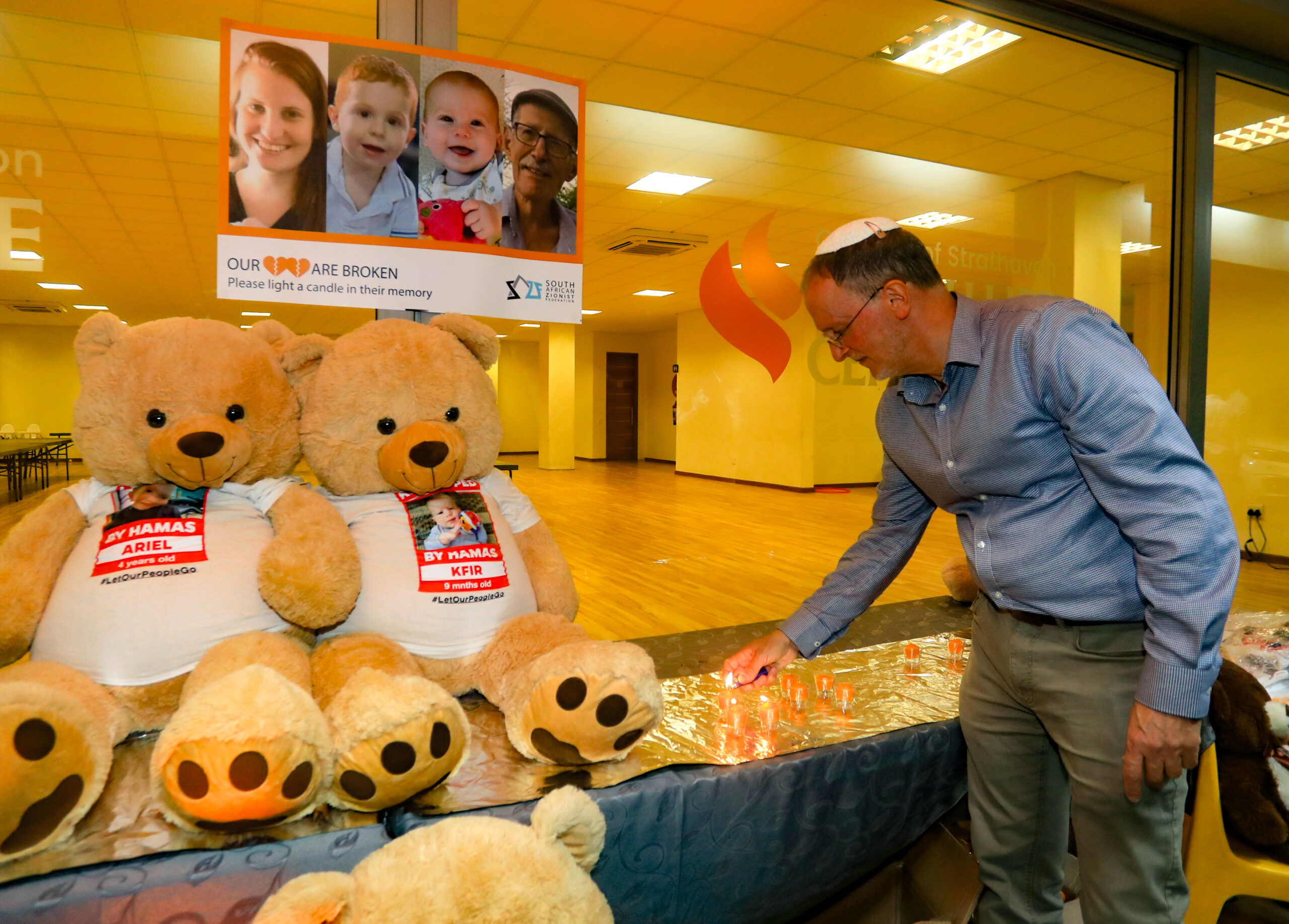
Community

Bibas’s family mourned with orange and bleak tears
“For Kfir and Ariel, live with all of your might. We wear the orange they could never see, so be young, be wild, and live wildly free. For the boys with bright orange hair dreamed too, and now, through our lives, their dreams will come true.”
The words of this poem, written by 23-year-old Johannesburg woman Yakira Shalpid, played over the loudspeaker in the background at a vigil held in honour of the hostages murdered in captivity. Many in the community shed tears of grief for Shiri, Ariel and Kfir Bibas, Oded Lifshitz, and the many others still to return from Gaza. The vigil was organised by South African Jewish Board of Deputies and the South African Zionist Federation at Beyachad in Johannesburg on 20 February.
Shalpid wrote the poem at the end of last year as a message to her Bnei Akiva channichim, who were in their final year of machaneh.
In it, she wrote of Kfir Bibas, “I dreamed of a boy with bright orange hair, so young and innocent, his future right there. A little boy from Nir Oz, in our homeland so dear, playing, learning, growing, not a care, not a fear. His ima and abba, Shiri and Yarden, raised him humbly with his brother, Ariel. On a kibbutz where the family learned to thrive and flourish, is the same place the monsters came, the same place they were punished into the depths of silence where no laughter rings.”
The loss of the Bibas children hit a raw nerve among Jews across the world, with many other communities gathering to commemorate the murders of the youngest person to be taken hostage, along with his four-year-old brother.
Members of the Johannesburg Jewish community braved the cold and rainy weather to light yahrzeit candles; stand in silence; place a pebble; write a note to a hostage family; let children draw pictures in honour of Ariel and Kfir; say tehillim; donate toys in memory of the Bibas children; and bear witness to the atrocities committed by Hamas on the south of Israel on 7 October 2023.
As people walked into Beyachad, they were met by two miniature ceramic dolls with orange hair, depicting the innocence of the Bibas babies, a teddy bear wearing a shirt with the image of Kfir, orange roses and orange candles.
For most Jews, this was the hardest day of the past 16 months, but they left the vigil with a sense of hope as one message on the board put it, “They can kill our bodies, but they can never kill our souls.”
The colour orange was unavoidable. Not only was the room filled with orange, but many members of the community chose to wear orange in honour of the ginger-haired Bibas boys. Many were heard saying that they would never be able to see the colour orange without thinking of these two babies who had gone too soon.
The middle of the room was dedicated to lighting yahrzeit candles, with the images of Lifshitz, Shiri, Ariel, and Kfir front and centre.
Amongst the more than 100 candles, there were yellow ribbons and messages of hope written on rocks. Alongside that, there were orange balloons, orange roses, and teddy bears as well as the Hebrew version of the popular children’s book Goodnight Moon.
Whilst walking around the room, people were reminded of the more than 60 hostages still held in Gaza and the fact that their future hangs in the balance. This was showcased not only through the images of those still left in captivity, but images of the horror and destruction Hamas caused on 7 October.
Many of those who came to the vigil were women, many with children of their own, who came to commemorate the life of Shiri Bibas. Upon entering the space, many burst into tears as they saw themselves in Shiri, and the fierce way that she tried to protect her two boys from the terrorists taking them hostage.
The vigil connected attendees with the Israeli community not only through mourning the four hostages who returned in coffins, but by conveying what was happening in Israel through news footage and scenes of Hostages Square in Tel Aviv shown on huge screens.
At the time of the footage, Israeli news channel MakoIl was informing the world that the body of Lifshitz had been positively identified, but authorities were unsure of the fate of the Bibas family.
As we left the space, the words of Shalpid’s poem rang through our ears with the words, “Yet still, the orange burns a fire in the night. It calls out to you now to hold up its light. For while their laughter fades and their childhoods undone, your whole life before you bathed in the sun.”






